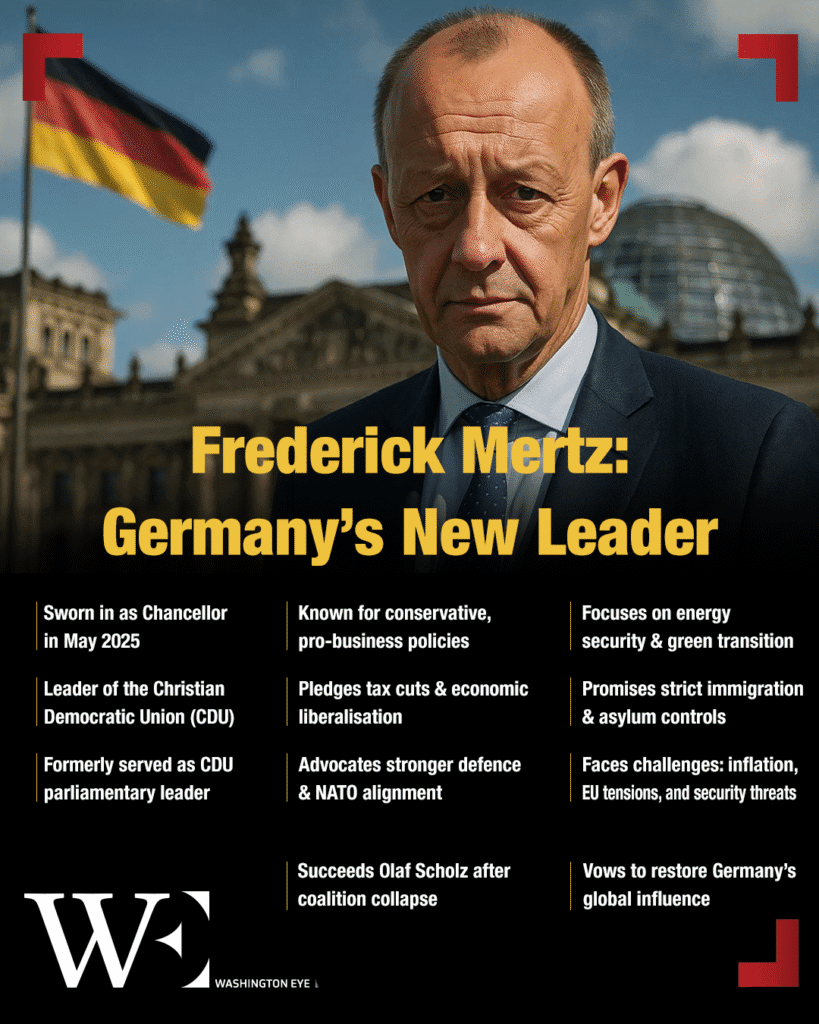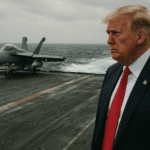On Tuesday, May 7, 2025, Germany officially swore in Friedrich Merz as its new Chancellor, marking the return of the center-right Christian Democratic Union (CDU) to the helm of Europe’s largest democracy. The inauguration took place following months of political upheaval and a watershed general election that upended the country’s post-Merkel political balance.
This leadership transition follows the February 2025 federal election, which resulted in the collapse of the ruling “traffic light” coalition of SPD (Social Democrats), Greens, and FDP (Free Democrats). The government, led by Chancellor Olaf Scholz, had faced growing criticism over economic stagnation, rising immigration tensions, energy insecurity, and its perceived indecisiveness on both domestic and international fronts.
The general election held on February 16, 2025, was a major political turning point. Olaf Scholz’s SPD saw a catastrophic drop in support — securing only 16.4% of the vote, their worst post-war performance. The Greens and FDP also suffered major setbacks, with the FDP falling below the 5% threshold, effectively eliminating it from the Bundestag.
Perhaps most shocking was the surge of the far-right Alternative für Deutschland (AfD), which garnered 20.8%, becoming the second-largest party in the Bundestag for the first time. While mainstream parties reaffirmed their refusal to work with the AfD, the party’s growing influence cast a long shadow over coalition negotiations.
Friedrich Merz’s swearing-in marks a personal and political comeback. The 69-year-old had been sidelined by Angela Merkel two decades ago and spent years in the private sector, most notably at BlackRock Germany. Merz returned to politics in 2018, became CDU leader in 2022, and has since repositioned the party to its conservative roots — advocating for tougher migration policies, lower taxes, and a stronger national identity.
Despite the CDU only achieving 28.5% of the vote — historically low for a winning party — Merz succeeded in forming a coalition government with the weakened SPD, prioritizing political stability and keeping the AfD out of power. It took three rounds of voting in the Bundestag to secure his election as Chancellor, a sign of how contentious and fragile this coalition may be.
Chancellor Merz has already outlined an ambitious, right-leaning agenda that seeks to reshape Germany’s domestic and international priorities. Merz’s CDU-led government is expected to pursue stricter asylum laws, faster deportation processes, and enhanced border controls. A proposed German-Polish border task force to deter irregular migration is already under review. He has vowed to restore fiscal discipline, reinstate Germany’s “debt brake”, and cut taxes for the middle class and businesses. His approach favors private sector-led growth, deregulation, and pension reform — a stark departure from Scholz’s center-left economic model. Merz is more pro-industry than his predecessor. While he supports the EU’s green goals, he favors nuclear energy, carbon capture technologies, and less regulation on the manufacturing sector. This could help Germany reindustrialize while maintaining climate commitments — though climate activists remain skeptical. A staunch Atlanticist and NATO supporter, Merz has pledged increased defense spending, deeper military cooperation with France, and renewed focus on transatlantic ties. He has called for Germany to “lead from the center” in Europe, advocating a more assertive foreign policy, particularly toward Russia and China. Notably, he has proposed a Franco-German-British nuclear deterrence dialogue — a provocative move aimed at ensuring Europe’s security amid U.S. uncertainties.
While Merz has assumed office, the road ahead is complex. His CDU-SPD coalition is fragile, and public opinion remains volatile. The AfD’s rise reflects deep regional divides — especially in eastern Germany — and growing distrust in establishment politics. Internationally, Merz faces a balancing act: reasserting German leadership in Europe while managing growing criticism from allies. The U.S. State Department expressed concern over the mainstreaming of far-right rhetoric in German debates — to which Merz responded sharply, insisting that “Germany will defend its sovereignty and democratic order without external lectures.”
The first 100 days of Merz’s chancellorship will be crucial. Key legislation on migration reform, budget discipline, and national security is expected by summer 2025. Germany’s position on the global stage — particularly regarding the war in Ukraine and Europe’s defense autonomy — will also test Merz’s leadership credentials. Whether he can maintain the fragile coalition, contain the far-right surge, and implement his ambitious reforms will define the future not just of Germany — but of European democracy itself.



















